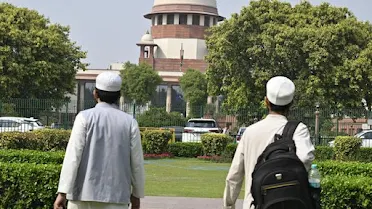Chief Justice Sanjiv Khanna, hearing around 100 petitions over the Waqf (Amendment) Act, proposes a three-point interim order to ‘balance equities’; court adjourns without passing any interim order
Visitors outside the Supreme Court of India on April 16, 2025. The apex court heard on a batch of petitions challenging the constitutional validity of the Waqf (Amendment) Act, 2025. | Photo Credit: Shiv Kumar Pushpakar
The Supreme Court on Wednesday (April 16, 2025) questioned provisions of the Waqf (Amendment) Act, 2025, which de-recognised the “established” waqf-by-user category of property, allowed non-Muslims into waqf administrative bodies and granted the state power to determine if a property was waqf or government.
The two-hour hearing of around 100 petitions in a packed courtroom saw Chief Justice of India Sanjiv Khanna, heading a three-judge Bench, refer to the communal violence in West Bengal over the 2025 Act as “very disturbing”.
During the hearing, the Chief Justice went on to propose a three-point interim order to “balance equities” on all sides in the case.
Firstly, he suggested that properties already declared waqf by courts need not, for the time being, be de-notified or treated as non-waqf properties. These would include properties categorised as ‘waqf-by-user’ or waqf by long usage without formal documentation or registration, waqf by declaration or “otherwise”.
Secondly, the CJI mooted that the designated government officer could continue to look into whether a property was waqf or government, but a connected proviso freezing the use of the property in the meanwhile as waqf (a property dedicated to Allah for charitable or religious purposes under Islam) could be stayed
Thirdly, the Chief Justice mulled giving the go-ahead to the appointment of non-Muslims as ex-officio members in the Central Waqf Council and Waqf Boards, provided the other members were Muslims.
However, the government stalled the passing of any interim order, seeking more time to argue. The case was adjourned to Thursday (April 17, 2025) at 2 p.m. without an interim order or issuance of notice to the Centre.
Huge problem’
The Chief Justice said the court would not normally intervene with legislation passed by the Parliament, but there were exceptions. The CJI voiced concern that denotification of waqf-by-user properties would lead to a “huge problem”.
“Before the Britishers came, we did not have land registration law or Transfer of Property Act. Many of the masjids were constructed in the 14th, 15th and 17th centuries. Asking them to produce a registered sale deed now is an impossibility. Like in the case of Jama Masjid, which is waqf-by-user property. If you had established ‘waqf-by-user’ in the versions of the Waqf Act prior to the 2025 Amendment Act, can it be made void now?” Chief Justice Khanna asked the Union government, represented by Solicitor General Tushar Mehta.
Senior advocate Kapil Sibal, for the petitioners, said “who was the state to say I cannot be a waqf-by-user? Many of these waqfs were created hundreds of years ago. Where do you find the records?”
Senior advocate Kapil Sibal, for the petitioners, said “who was the state to say I cannot be a waqf-by-user? Many of these waqfs were created hundreds of years ago. Where do you find the records?”





